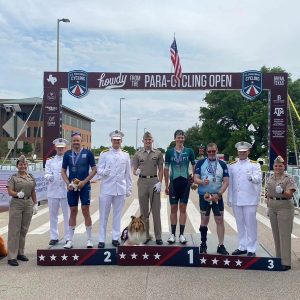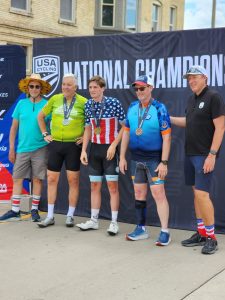 I am a Law Enforcement Officer. A “street cop”. I have disabilities. To the naked eye, you wouldn’t know. I call them “hidden disabilities”. I was born with a couple, potentially related, congenital birth defects. One is Clubfoot. It’s a lower limb neuromuscular disease. At this point in my life, my ankle is basically fused. I wear an Allard BlueROCKER® 2 ½ AFO on my right leg to help on long walks, running, and cycling. The other hidden disability is Prune Belly Syndrome. It starts in the womb and the cause is unknown. It affects people in varying degrees – lack of abdominal muscles, possible testicular, urinary, kidney, and hernia issues. Clubfoot is present in about 20% of cases. I have some more minor effects, but I consider myself lucky. Clubfoot is a bigger issue for me.
I am a Law Enforcement Officer. A “street cop”. I have disabilities. To the naked eye, you wouldn’t know. I call them “hidden disabilities”. I was born with a couple, potentially related, congenital birth defects. One is Clubfoot. It’s a lower limb neuromuscular disease. At this point in my life, my ankle is basically fused. I wear an Allard BlueROCKER® 2 ½ AFO on my right leg to help on long walks, running, and cycling. The other hidden disability is Prune Belly Syndrome. It starts in the womb and the cause is unknown. It affects people in varying degrees – lack of abdominal muscles, possible testicular, urinary, kidney, and hernia issues. Clubfoot is present in about 20% of cases. I have some more minor effects, but I consider myself lucky. Clubfoot is a bigger issue for me.
I am also an athlete. I race in the para (disability) division in cycling and triathlon. I like to hunt, fish, shoot, and mess with things that have motors. I also do radio and TV voiceover, and coach high school cross country.
As an athlete, it’s a very welcoming, supportive environment. As a cop, it’s a lesser-known thing. There are Police Officers with varying disabilities. I’m aware of one with one arm, a few with below knee amputations, and a few with Clubfoot, and 1 with Prune Belly Syndrome.
In my case, it presents no real work-based problems. I can pass the Physical Fitness Test just fine. I can do the functions of the job with no problem. I am a slow runner, but can go long! And there are some individuals that are probably slower. I consider it a responsibility to myself, my coworkers, and those that need help to be in good physical condition – able to stay “in the fight” or be of help in a situation that requires some stamina. That’s the least I can do. I’ve had a few conversations with other cops with disabilities, and I believe we all feel that way. The truth is that it sometime seems we even work harder at that than many able-bodied officers. I do have some insecurities about having a skinnier leg, or a “beer” belly. Most people that say something have no clue…so I try to ignore it or explain it. As I’ve gotten older, I don’t care as much.

A couple of the cops I’ve talked to feel that they are just fine doing the job. They seem to have adapted the way they do things to the way we’re trained. I suppose I’m no different. I kneel a certain way and get back up a bit differently than normal. I know when I do the Physical Fitness Test, I do a particular part my own way. The Bodycam videos I’ve seen on the cop with the prosthetic arm generally seems that he’s got it down to a system.
The Prune Belly people I’ve talked to have been on Fire and EMT services, with one Law Enforcement. One is a reserve, and does more EMT work than Fire. He explains that he has a hard time lifting and dragging heavier people. He feels that can be an impediment to doing the job well. He’s also had several surgeries, and is now having hip problems. I can see that causing some issues.
As for how other cops view those with disabilities…. I get teased a little when I’m training for sports. I enjoy the banter. I am not offended in the least. There are others that have seen me running or cycling, and the recognize me later because of my AFO. I think, in my case, most of the First Responders I’ve encountered have no idea I have physical disabilities. It’s not like it comes up in conversation as a rule. I would also assume there are those that think it’s a bad idea to have us working in these positions. They probably think we lack the ability somehow. Truthfully, that would probably be because they hadn’t been in a tough situation with one of us. Those times where we had to come out on the winning end. We do…just as often as they do. It could be argued that we might be tougher in those situations because we deal with challenges everyday. It’s not a big deal to us. I think it’s a lack of understanding and knowledge more than anything.
My Chief, and most others, feel the gold standard is the Physical Fitness Test. If you can pass that, you’ve met the required standard. I agree. If I felt that anyone, or myself were endangered by my disability, I would not continue in my job. However, that has yet to happen, nor do I expect it to.
I think there are also those that avoid it all together because they think they can’t, or won’t be well received. I believe that can be proved wrong. In my experience, physical fitness, while a little more difficult for us possibly, leads to better outcomes overall in life. The same thing could be said for First Responders with, or without disabilities.
There are some, able-bodied or otherwise, that obviously should not go into these fields. But there are also some that can certainly do them, and thrive in First Responder jobs. I believe it’s worth a try. The truth is, that we all experience challenges in life. One person’s challenges are another’s normal. It’s all relative. What you do with that is largely up to you!


Recent Comments